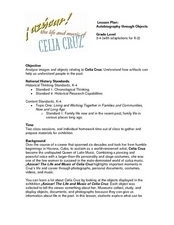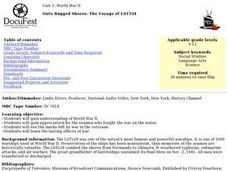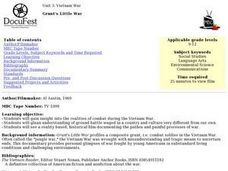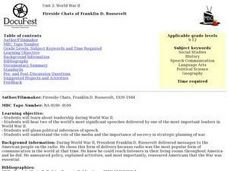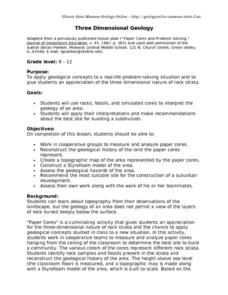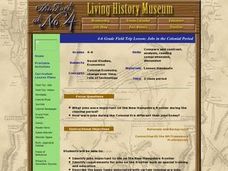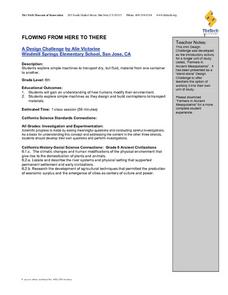Museum of Tolerance
Just What Kind of American Are You?
Your parents were both in different countries. You were born in the US. Documents and application forms ask you to identify your racial or ethnic classification. Which box do you check? Class members collect documents...
Laboratory for Atmospheric and Space Physics
Space Travel Guide
Looking to take a trip? Why not go to space? Here, scholars take on the role as travel agent to create a guide to their favorite planet including travel tips and sightseeing recommendations.
University of Colorado
Space Travel Guide
Neptune takes 164.8 Earth years to travel around the sun. In the fifth of 22 lessons, young scientists create a travel guide to a planet in our solar system. They provide tips for others on what to bring, what they see, and their...
Smithsonian Institution
Autobiography through Objects
Show youngsters how objects can tell a story! Here your class will learn about Cuban salsa dancer Celia Cruz by analyzing pictures of her dress, her shoes, and her marriage certificate. After describing Cruz's items and imagining what...
Curated OER
Fossil Find
Students investigate the practice of digging for fossils. They participate in a mock dig of fossils using real bones and other artifacts. Then students dig through sand in order to go through the simulation. Students make observations...
Museum of Disability
Taking Visual Impairment to School
What is the world like when you can't see, or when your vision is impaired? Learn about how Lisa communicates with the world around her with Taking Visual Impairment to School by Rita Whitman Steingold. Learners answer...
National WWII Museum
“My Dear Little Boys…” Interpreting a letter home from the war
Letters have long been prized by historians as primary sources for what they reveal not only about events but also about the emotional responses of the writers to these events. "My Dear Little Boys," a letter written by Leonard Isacks on...
Curated OER
Predicting the Past
Students study how archaeologists record the past. They discuss archaeology and artifacts. They view a list of artifacts discovered by Marquette at the Illinois Village and answer questions regarding them. They complete a test about...
Curated OER
Outo Rugged Shores: The Voyage of LST534
Students view a film about warships during World War II. They discover the job of a seaman and what impact veterens have on the world today. They also examine the lasting effects of the war.
Curated OER
Grunt's Little War
High schoolers view a film about the role of the soldier during the Vietnam War. They discover what it was like to fight a war against a culture so unlike our own. They answer questions to complete the lesson.
Curated OER
Sadorus Photograph Collection Activity: Analysis of an Historical Photograph
Young scholars retrive social, cultural, and historical information from a photograph by analyzing the contents. Data about the subject's culture, people, events, and place is explored.
Curated OER
Fireside Chats of Franklin D. Roosevelt
High schoolers view a film about Franklin D. Roosevelt and his fireside chats. THey identify political inferences in his speeches and how the media played an important role in the war. They answer questions to complete the instructional...
Curated OER
Colors of Gray
Students view a film about theatres in Chicago. They discover how performing arts can be enjoyed by all ages and how one becomes involved in performing in theatre. They answer questions and discuss to end the lesson.
Curated OER
Chinese, Japanese, & Korean Immigration to the U. S.
Students study immigration of people from Southeast Asian countries to the United States. Pupils create maps and geographically illustrate the immigration. Using the internet, students research an assigned topic. They write an essay...
Curated OER
Entertaining Vancouver's Youth During World War II.
Learners investigate relevant period documents and artifacts and have the
opportunity to replicate a 1943-44 entertainment experience by viewing a program
of World War II era motion pictures on site at Vancouver's historic...
Curated OER
Three Dimensional Geology
Students use rocks and fossils to interpret the geology of an area. They use prior knowledge and make recommendations about where to build a subdivision based on the rocks.
Curated OER
Exploring Suffragists
Students engage in a conversation with the class about suffrage- the right to vote. They choose one specific suffragist and use the Internet and other reference materials to learn more about this person. They prepare a presentation to...
Curated OER
No Food, No Money, No Job: What to Do?
Students explore the concept of philanthropy. For this service learning lesson, students research the Civilian Conservation Corps and create an advertisement that might have promoted it.
Curated OER
Jobs in the Colonial Period
Students identify jobs and their requirements that were important on the New Hampshire frontier. They analyze the importance of certain jobs and compare and contrast them with jobs today. They also examine the role of technology in...
Curated OER
Environmental Hazards
Students identify environmental hazards on a simulated field trip. They analyze the exposure and suggest methods to eliminate or reduce exposure to toxic sources.
Curated OER
Introduction to Pinning Insects
Students are introduced to how to properly pin insects by reviewing insect morphology, insect orders and recognizing that the second and third thoracic segments contain large locomotor muscles that bind to the pin.
Curated OER
Reader's Theater
Students act out and interpret the story for their peers. They study the simplest form of an organized reading to a more elaborate activity involving props, costumes, or a reinterpretation of the narrative into another art form.
Curated OER
Salty Sea Water
Learners conduct an experiment to find out if there is salt in the ocean. In this scientific inquiry lesson, students pour a cup of salt water onto an aluminum plate and observe the changes over a few days. Learners complete an included...
Curated OER
Flowing From Here to There
Sixth graders discover how humans modify their environment. They work together to design their own simple machine to transport materials. They record observations and suggest modifications.



